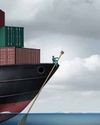
Discussion in the session revolved around the customer for offering him the best experience either in terms of cost, service efficiency, transparency using technology or customer support.
T Venkataraman, MD, Goodrich Maritime Pvt Ltd: Please advise on the most competitive, viable and efficient options for transporting goods, using your own experience to benefit the shipper?
Ms Vinita Venkatesh, Director, Navayuga Container Terminal Pvt Ltd: One of the ways for a seaport to increase its volumes is by offering lower cost and more efficient transit to customers and make him more competitive in global markets. But it has to be a concerted effort by the port, shipping line, freight forwarder and the CHA all together. For instance, ICD Sanathnagar traditionally used to move cargo through JNPT at a distance of 858km instead of Krishnapatnam Port which is at a distance of 75km with mainlines connecting China and Korea. One rake of CONCOR on the Sanathnagar-JNPT lane makes one trip per week due to highly congested rail corridor. If the same rake is deployed on the SanathnagarKrishnapatnam Port route it can make two-and-half trips per week. Thus CONCOR is able to earn more on this route. For shipping line Krishnapatnam Port offers lower rail freight by Rs.2000 per box, while the freight rate is higher by $15-20 making it a win-win situation. The end customer on an import saves 12.7 days at Krishnapatnam Port as compared to JNPT. Further, Pennon Shipping is deploying a 400teu vessel from Krishnapatnam to Chattogram Port.
This story is from the October 2019 edition of Maritime Gateway.
Start your 7-day Magzter GOLD free trial to access thousands of curated premium stories, and 9,000+ magazines and newspapers.
Already a subscriber ? Sign In
This story is from the October 2019 edition of Maritime Gateway.
Start your 7-day Magzter GOLD free trial to access thousands of curated premium stories, and 9,000+ magazines and newspapers.
Already a subscriber? Sign In

Impact Of Covid-19 On Shipping And Logistics
Industry stalwarts discuss threadbare the prevailing logistics and supply chain scenario and issues in clearing cargo during the COVID-19 lockdown

Digital Platforms Defy Lockdown
Digital trading modules such as eNAM are enabling farmers to move their produce from farm to market even during the lockdown

GARMENT TRADE TRAMPLED
As retailers face a shutdown in US and Europe, the cascading affect has caused mass cancellation of orders in Bangladesh

TRADE RESUMES WITH CHINA
While India has allowed uninterrupted movement of imports into Nepal even during lockdown, China is reopening its borders as it emerges from the pandemic
LESS HUMAN INTENSIVE, MORE DATA DRIVEN
AI provides transformational opportunity for logistics industry by improving customer experience, operational efficiency, faster turnaround time and lower cost while ensuring security and transparency. Macro environment requires industry to transform to be less human intensive, agile and data driven, all of which can be accelerated by AI adoption, shares Gangadhar Gude, Founder & CEO, atai.ai

SHAKEN AND STIRRED
The COVID-19 pandemic has partially paralysed the logistics and supply chain, but the industry is still deterred to ensure supply of essentials continues

TRADE STUCK, ECONOMY SLOWS DOWN
Sri Lankan economy slows down as trade deficit widens and supply chain disrupts amidst lockdown

LENDING INTELLIGENCE TO SUPPLY CHAIN
If you’re shipping millions of dollars’ worth of pharmaceuticals, high-end electronics, expensive seafood, or precious metals, what would you be willing to pay for the ability to ‘ask’ your shipment where it is right now and whether it’s ok? What would you pay for a freight smart enough to raise an alarm before it spoils? Artificial Intelligence enables that and much more…

CONTAINER LINES SIGNAL ‘SOS'
As the per-unit cost of operations increases many lines are forced to blank sailings which has hit their bottom line real hard. The Government and Terminal Operators therefore need to actively consider reduction in Vessel Related Costs

IMO 2020 And The Covid-19 Curse
The COVID-19 outbreak has shaken and stirred the already volatile bunker market. While the refiners adjust their capacities and shipping lines choose their path to compliance, the market dynamics are yet to reach an equilibrium